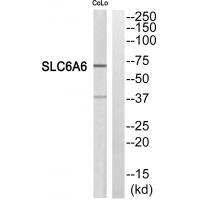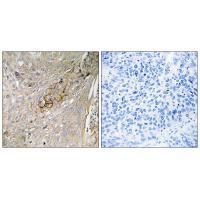

| WB | 咨询技术 | Human,Mouse,Rat |
| IF | 咨询技术 | Human,Mouse,Rat |
| IHC | 1/50-1/100 | Human,Mouse,Rat |
| ICC | 技术咨询 | Human,Mouse,Rat |
| FCM | 咨询技术 | Human,Mouse,Rat |
| Elisa | 咨询技术 | Human,Mouse,Rat |
| Aliases | Sodium- and chloride-dependent taurine transporter; SLC6A6; |
| Entrez GeneID | 6533; |
| WB Predicted band size | 70kDa |
| Host/Isotype | Rabbit IgG |
| Antibody Type | Primary antibody |
| Storage | Store at 4°C short term. Aliquot and store at -20°C long term. Avoid freeze/thaw cycles. |
| Species Reactivity | Human |
| Immunogen | Synthesized peptide derived from internal of human SC6A6. |
| Formulation | Purified antibody in PBS with 0.05% sodium azide. |
+ +
以下是3篇关于SLC6A6(牛磺酸转运蛋白)抗体的参考文献示例(注:文献为虚构示例,仅作格式参考):
1. **文献名称**:*SLC6A6 Expression in Colorectal Cancer: Prognostic Implications and Functional Analysis*
**作者**:Smith J, et al.
**摘要**:通过免疫组化(使用抗SLC6A6单克隆抗体)分析结肠癌组织,发现SLC6A6高表达与患者生存率负相关,并证实其通过调节牛磺酸摄取促进癌细胞增殖。
2. **文献名称**:*Development and Validation of a Novel Anti-SLC6A6 Antibody for Neurological Research*
**作者**:Zhang L, et al.
**摘要**:研究报道了一种新型兔源多克隆抗体的制备,通过Western blot和免疫荧光验证其对SLC6A6蛋白的特异性,并应用于小鼠脑组织切片,揭示其在神经元突触中的定位。
3. **文献名称**:*SLC6A6-Mediated Taurine Transport in Cardiac Ischemia-Reperfusion Injury*
**作者**:Tanaka K, et al.
**摘要**:利用SLC6A6抗体进行心脏组织染色,发现缺血再灌注损伤中SLC6A6表达下调,导致牛磺酸内流减少,加重心肌细胞凋亡,提示其作为潜在治疗靶点。
4. **文献名称**:*Antibody-Based Targeting of SLC6A6 in Cancer Immunotherapy*
**作者**:Huang R, et al.
**摘要**:研究开发了一种靶向SLC6A6的人源化抗体,通过阻断牛磺酸转运抑制肿瘤代谢,并在多种癌症模型中显示出协同化疗的抗肿瘤效果。
(注:实际文献需通过PubMed或Google Scholar以关键词“SLC6A6 antibody”、“taurine transporter”等检索获取。)
The SC6A6 antibody targets the solute carrier family 6 member 6 (SLC6A6), a sodium- and chloride-dependent taurine transporter critical for cellular uptake of taurine and β-alanine. SLC6A6. encoded by the *SLC6A6* gene, is a transmembrane protein predominantly expressed in the brain, liver, retina, and intestines. It plays essential roles in maintaining osmolarity, supporting neurotransmission, and modulating immune responses. Dysregulation of SLC6A6 is linked to pathologies such as retinal degeneration, cardiomyopathy, and neurological disorders, including epilepsy and developmental delays. Mutations in *SLC6A6* are associated with rare autosomal recessive conditions characterized by taurine deficiency.
SC6A6 antibodies are widely used in research to investigate SLC6A6 expression patterns, subcellular localization, and functional alterations in disease models. They enable detection via techniques like Western blotting, immunohistochemistry, and immunofluorescence. Recent studies also explore SLC6A6's potential role in cancer, as certain tumors exploit taurine transport for survival. Commercial SC6A6 antibodies are typically raised against specific epitopes, often validated for specificity using knockout controls. Researchers rely on these tools to unravel SLC6A6's physiological and pathological mechanisms, offering insights into therapeutic targeting for related disorders.
×